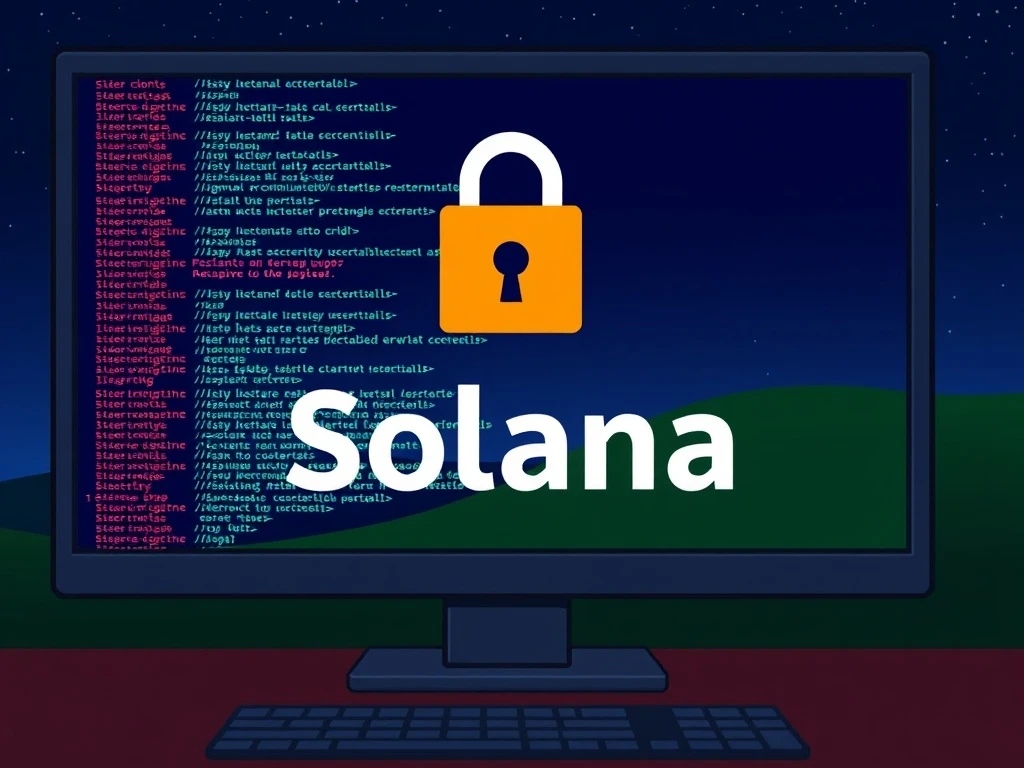Urgent: Solana Bot Scam on GitHub Exposes Crypto Wallet Security Risks

Attention crypto users! A dangerous new threat has emerged targeting those interested in Solana trading bots. A fake GitHub repository, designed to mimic legitimate tools, has been distributing malware capable of stealing your valuable crypto wallet credentials. This highlights critical vulnerabilities in crypto wallet security when interacting with unverified software.
Understanding the Solana Bot Scam on GitHub
According to a recent SlowMist report, a GitHub account hosted a repository named “solana-pumpfun-bot.” This repository was presented as a functional Solana trading bot, but its true purpose was malicious. It was designed to lure users into downloading code that contained hidden malware. The cybersecurity firm SlowMist launched an investigation after a user reported stolen funds, uncovering the details of this operation.
Key findings from the SlowMist investigation:
- The fake repository had artificially inflated popularity (stars and forks).
- Code commits showed irregularities, lacking the pattern of legitimate development.
- The project relied on a suspicious Node.js package, “crypto-layout-utils.”
How the GitHub Crypto Theft Happened
The core of the attack involved the dependency package “crypto-layout-utils.” SlowMist researchers found this package had been removed from the official NPM registry, raising immediate suspicion. Further analysis revealed the attacker was hosting this package on a separate GitHub repository.
Once downloaded, the package was heavily obfuscated, making it difficult to analyze. After de-obfuscation, SlowMist confirmed its malicious nature. The malware was designed to scan local files for sensitive information, specifically wallet-related content and private keys, and then upload this data to a remote server controlled by the attacker. This is a classic method for GitHub crypto theft.
The Broader Software Supply Chain Attack
SlowMist’s investigation didn’t stop with the single repository. They discovered evidence suggesting the attacker controlled a network of GitHub accounts. These accounts were used to fork legitimate projects and inject malicious code, creating numerous variations of the scam while boosting the apparent credibility of the fake repositories through inflated metrics.
This tactic is part of a larger trend of software supply chain attacks, where attackers compromise components or dependencies used in software development to distribute malware widely. Multiple forked repositories were found exhibiting similar malicious features, some using another suspicious package, “bs58-encrypt-utils-1.0.3.” SlowMist estimates the distribution of these malicious modules began around June 12th.
Protecting Your Crypto Wallet Security
This incident serves as a stark reminder of the risks associated with downloading code, even from platforms like GitHub. When seeking open-source tools, especially those dealing with financial assets like crypto, extreme caution is advised. Always verify the legitimacy of the project, check the reputation of the account hosting it, and be wary of projects with suspicious dependency lists or irregular development patterns. Relying on trusted, well-established sources is paramount for maintaining crypto wallet security.
Conclusion: Lessons from the SlowMist Report
The SlowMist report on the Solana bot scam highlights the evolving tactics of crypto attackers. They are increasingly targeting the software supply chain, using platforms like GitHub to distribute sophisticated malware. Users must remain vigilant, exercise caution when downloading and executing code related to cryptocurrencies, and prioritize the security of their private keys and wallet credentials. Staying informed about these threats is the first step in protecting your digital assets.







